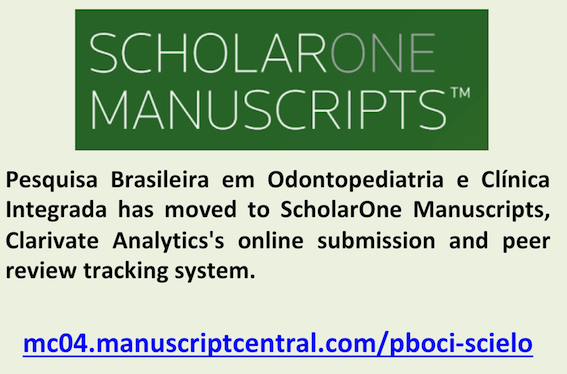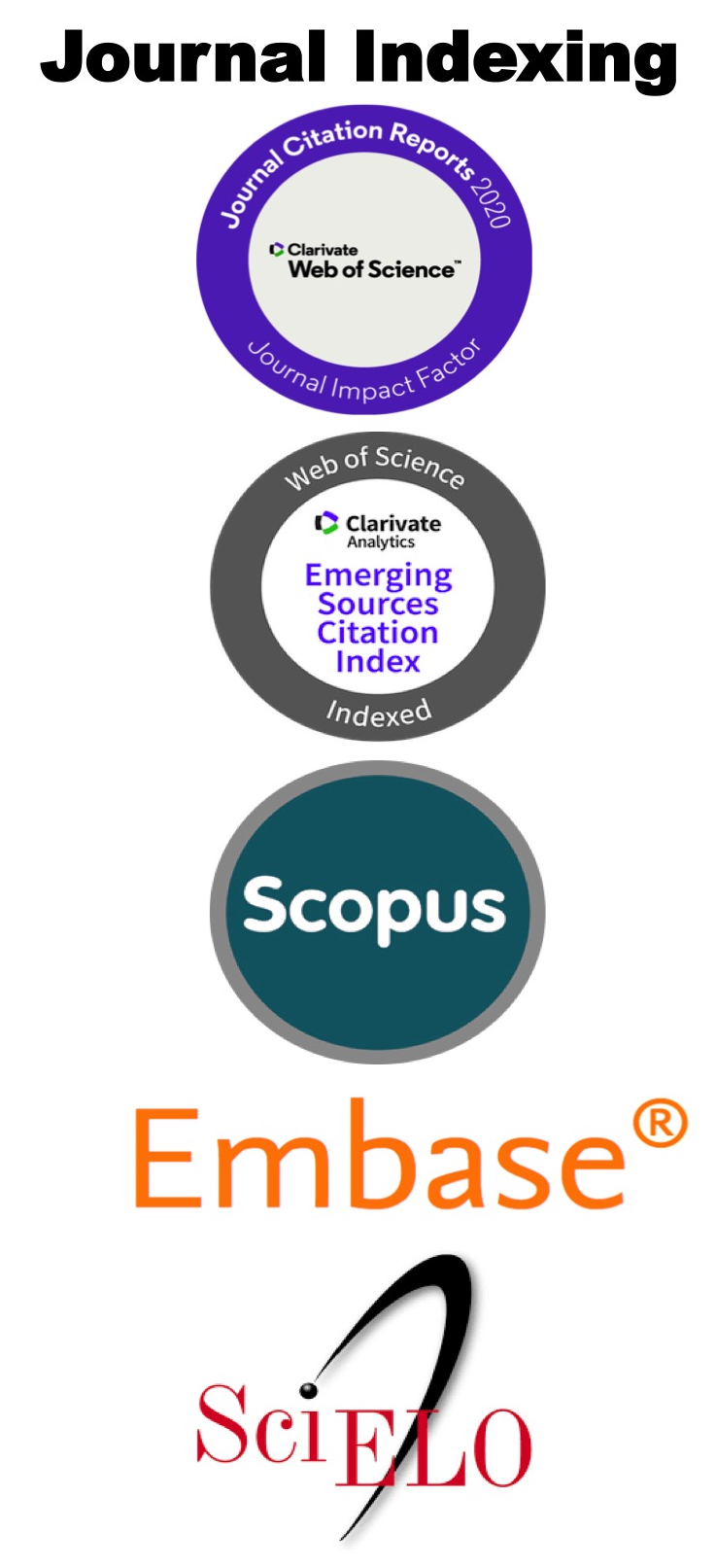In Vitro Microscopic Evaluation of Metal- And Zirconium-Oxide-Based Crowns’ Marginal Fit
Keywords:
Dental Prosthesis, Crowns, Zirconium, Gingiva, Dental PorcelainAbstract
Objective: To evaluate the marginal adaptation of computer-aided designing and computer-aided machining (CAD/CAM) fabricated cobalt-chromium and zirconium-oxide-based ceramic crowns compared to those produced by a conventional method. Material and Methods: The study consists of three groups; 45 crowns fabricated from cobalt-chromium (CAD-CoCr) and 45 crowns manufactured from zirconium CAD/CAM technology (CAD-Z), and 45 control (C) which consists of conventional metal-ceramic crowns. The marginal discrepancies in vertical dimensions were assessed utilizing a microscope in four surfaces (mesial, distal, vestibular, and oral) for each crown. On completion of the microscopic evaluation, multivariate analysis of variance (MANOVA) was used to study the difference in the four surfaces, considered altogether. Two-way ANOVA revealed the effect of three systems used for gap measurements of each landmark. The differences observed were considered significant at p<0.05. Results: There were no differences in the four surfaces revealed by АNOVА in the three groups when considered altogether. Two-way ANOVA of each surface discovered no differences among all groups as well. Conclusion: The CAD/CAM crowns revealed a comparable and satisfactory marginal adaptation compared to conventional metal-ceramic crowns.References
Jurado CA, Villalobos-Tinoco J, Tsujimoto A, Castro P, Torrealba Y. The art of minimal tooth reduction for veneer restorations. European J Gen Dent 2020; 9(1): 45-52. https://doi.org/10.4103/ejgd.ejgd_173_19
Forrer FA, Schnider N, Brägger U, Yilmaz B, Hicklin SP. Clinical performance and patient satisfaction obtained with tooth-supported ceramic crowns and fixed partial dentures. J Prosthet Dent 2020; S0022-3913(19):30542-46. https://doi.org/10.1016/j.prosdent.2019.08.012
Demir N, Ozturk AN, Malkoc MA. Evaluation of the marginal fit of full ceramic crowns by the micro computed tomography (micro CT) technique. Eur J Dent 2014; 8(4): 437-444. https://doi.org/10.4103/1305-7456.143612
Martins F, Reis J, Barbero Navarro I, Maurício P. Dimensional stability of a preliminary vinyl polysiloxane impression material. Dent J 2019; 7(3):81. https://doi.org/10.3390/dj7030081
Xu Y, Unkovskiy A, Klaue F, Rupp F, Geis-Gerstorfer J, Spintzyk S. Compatibility of a silicone impression/adhesive system to FDM-printed tray materials - a laboratory peel-off study. Materials 2018; 11(10):1905. https://doi.org/10.3390/ma11101905
Rokaya D, Mahat Y, Sapkota B, Kc Basnyat S. Full coverage crowns and resin-bonded bridge combination for missing mandibular anterior teeth. Kathmandu Univ Med J 2018; 16(61):97-9.
Pelekanos S, Koumanou M, Koutayas SO, Zinelis S, Eliades G. Micro-CT evaluation of the marginal fit of different In-Ceram alumina copings. Eur J Esthet Dent 2009; 4(3): 278-92.
Kokubo Y, Ohkubo C, Tsumita M, Miyashita A, Vult von Steyern P, Fukushima S. Clinical marginal and internal gaps of Procera All Ceram crowns. J Oral Rehabil 2005; 32(7):526-30.
https://doi.org/10.1111/j.1365-2842.2005.01458.x
Boitelle P, Tapie L, Mawussi B, Fromentin O. Evaluation of the marginal fit of CAD-CAM zirconia copings: comparison of 2D and 3D measurement methods. J Prosthet Dent 2018; 119(1):75-81. https://doi.org/10.1016/j.prosdent.2017.01.026
Conrad HJ, Seong WJ, Pesun IJ. Current ceramic materials and systems with clinical recommendations: a systematic review. J Prosthet Dent 2007; 98(5):389-404. https://doi.org/10.1016/S0022-3913(07)60124-3
Bottino MA, Valandro LF, Buso L, Ozcan M. The influence of cervical finish line, internal relief, and cement type on the cervical adaptation of metal crowns. Quintessence Int. 2007; 38(7): e425-e432.
An S, Kim S, Choi H, Lee JH, Moon HS. Evaluating the marginal fit of zirconia copings with digital impressions with an intraoral digital scanner. J Prosthet Dent 2014; 112(5):1171-5. https://doi.org/10.1016/j.prosdent.2013.12.024
Faot F, Suzuki D, Senna PM, da Silva WJ, de Mattias Sartori IA. Discrepancies in marginal and internal fits for different metal and alumina infrastructures cemented on implant abutments. Eur J Oral Sci 2015; 123(3):215-9. https://doi.org/10.1111/eos.12181
Beuer F, Schweiger J, Edelhoff D. Digital dentistry: an overview of recent developments for CAD/CAM generated restorations. Br Dent J 2008; 204(9):505-11. https://doi.org/10.1038/sj.bdj.2008.350
Alghazzawi TF, Al-Samadani KH, Lemons J, Liu PR, Essig ME, Bartolucci AA, et al. effect of imaging powder and CAD/CAM stone types on the marginal gap of zirconia crowns. J Am Dent Assoc 2015; 146(2):111-20. https://doi.org/10.1016/j.adaj.2014.10.006
Contrepois M, Soenen A, Bartala M, Laviole O. Marginal adaptation of ceramic crowns: a systematic review. J Prosthet Dent 2013; 110(6):447-454.e10. https://doi.org/10.1016/j.prosdent.2013.08.003
Rahme HY, Tehini GE, Adib SM, Ardo AS, Rifai KT. In vitro evaluation of the "replica technique" in the measurement of the fit of Procera crowns. J Contemp Dent Pract 2008; 9(2):25-32.
Shembesh M, Ali A, Finkelman M. An in vitro comparison of the marginal adaptation accuracy of CAD/CAM restorations using different impression systems. J Prosthodont 2017; 26(7):581-6. https://doi.org/10.1111/jopr.12446
Tan PL, Gratton DG, Diaz-Arnold AM, Holmes DC. An in vitro comparison of vertical marginal gaps of CAD/CAM titanium and conventional cast restorations. J Prosthodont 2008; 17(5):378-83.
https://doi.org/10.1111/j.1532-849X.2008.00302.x
Reich S, Gozdowski S, Trentzsch L, Frankenberger R, Lohbauer U. Marginal fit of heat-pressed vs. CAD/CAM processed all-ceramic onlays using a milling unit prototype. Oper Dent 2008; 33:644-50.
https://doi.org/10.2341/07-162
Ushiwata O, Moraes JV. Method for marginal measurements of restorations: Accessory device for toolmakers microscope. J Prosthet Dent 2000; 83:362-6. https://doi.org/10.1016/S0022-3913(00)70141-7
Neves FD, Prado CJ, Prudente MS, Carneiro TA, Zancopé K, Davi LR, et al. Micro-computed tomography evaluation of marginal fit of lithium disilicate crowns fabricated by using chairside CAD/CAM systems or the heat-pressing technique. J Prosthet Dent 2014; 112(5):1134-40. https://doi.org/10.1016/j.prosdent.2014.04.028
Mously HA, Finkelman M, Zandparsa R, Hirayama H. Marginal and internal adaptation of ceramic crown restorations fabricated with CAD/CAM technology and the heat-press technique. J Prosthet Dent 2014; 112(2):249-56. https://doi.org/10.1016/j.prosdent.2014.03.017
Freire Y, Gonzalo E, Lopez-Suarez C, Suarez MJ. The marginal fit of CAD/CAM monolithic ceramic and metal-ceramic crowns. J Prosthodont 2017; 28(3):1-6. https://doi.org/10.1111/jopr.12590
Tamac E, Toksavul S, Toman M. Clinical marginal and internal adaptation of CAD/CAM milling, laser sintering, and cast metal ceramic crowns. J Prosthet Dent 2014; 12(4):909-13. https://doi.org/10.1016/j.prosdent.2013.12.020
Lee B, Oh KC, Haam D, Lee JH, Moon HS. Evaluation of the fit of zirconia copings fabricated by direct and indirect digital scanning procedures. J Prosthet Dent 2018; 120(2):225-31. https://doi.org/10.1016/j.prosdent.2017.08.003
Kocaağaoğlu H, Kılınç HI, Albayrak H. Effect of digital impressions and production protocols on the adaptation of zirconia copings. J Prosthet Dent 2017; 117(1):102-8. https://doi.org/10.1016/j.prosdent.2016.06.004
Nagarkar SR, Perdigão J, Seong WJ, Theis-Mahon N. Digital versus conventional impressions for full-coverage restorations: a systematic review and meta-analysis. J Am Dent Assoc 2018; 149(2):139-47. https://doi.org/10.1016/j.adaj.2017.10.001
Souza RO, Ozcan M, Pavanelli CA, Buso L, Lombardo GH, Michida SM, Mesquita AM, et al. Marginal and internal discrepancies related to margin design of ceramic crowns fabricated by a CAD/CAM system. J Prosthodont 2012; 21(2):94-100. https://doi.org/10.1111/j.1532-849X.2011.00793.x
Miura S, Inagaki R, Kasahara S, Yoda M. Fit of zirconia all-ceramic crowns with different cervical margin designs, before and after porcelain firing and glazing. Dent Mater J 2014; 33(4):484-89.
https://doi.org/10.4012/dmj.2013-284
Rosenstiel SF, Land MF, Fujimoto J. Contemporary Fixed Prosthodontics. 5th. ed. St. Louis: Mosby/Elsevier Inc.; 2016.
Biscaro L, Bonfiglioli R, Soattin M, Vigolo P. An in vivo evaluation of fit of zirconium-oxide based ceramic single crowns, generated with two CAD/CAM systems, in comparison to metal ceramic single crowns. J Prosthodont 2013; 22(1):36-41. https://doi.org/10.1111/j.1532-849X.2012.00907.x
Mosharraf R, Azizi A, Naziri B, Abolhasani M. The effects of cement space thickness and material type on marginal discrepancy of restoration. Braz Dent Sci 2021; 24(1):1-8. https://doi.org/10.14295/bds.2021.v24i1.1968
Elbadawy AA, Elaziz MHA, Alnazzawi AA, Borzangy SS. Effect of various digital cement space settings on the adaptation of CAD/CAM occlusal veneer "micro-ct evaluation". Dent Mater J 2021; 40(3):625-30. https://doi.org/10.4012/dmj.2020-226
Heboyan A, Manrikyan M, Zafar MS, Rokaya D, Nushikyan R, Vardanyan I, et al. Bacteriological evaluation of gingival crevicular fluid in teeth restored using fixed dental prostheses: an in vivo study. Int J Mol Sci 2021; 22(11):5463. https://doi.org/10.3390/ijms22115463
Mohamed MS, Mohsen CA, Katamish H. Impact of chemical aging on the fracture resistance of two ceramic materials: zirconia-reinforced lithium silicate and lithium disilicate ceramics. Open Access Maced J Med Sci 2020; 8(D):189-93. https://doi.org/10.3889/oamjms.2020.5155
Holmes JR, Bayne SC, Holland GA, Sulik WD. Considerations in measurement of marginal fit. J Prosthet Dent 1989; 62(4):405-8. https://doi.org/10.1016/0022-3913(89)90170-4
Sakornwimon N, Leevailoj C. Clinical marginal fit of zirconia crowns and patients' preferences for impression techniques using intraoral digital scanner versus polyvinyl siloxane material. J Prosthet Dent 2017; 118(3):386-91. https://doi.org/10.1016/j.prosdent.2016.10.019
Heboyan A, Syed AUY, Rokaya D, Cooper PR, Manrikyan M, Markaryan M. Cytomorphometric analysis of inflammation dynamics in the periodontium following the use of fixed dental prostheses. Molecules 2020; 25(20):4650. https://doi.org/10.3390/molecules25204650
Heboyan AG, Manrikyan ME, Markaryan MM, Vardanyan IF. Changes in the parameters of gingival crevicular fluid in masticatory function restoration by various prosthodontic constructions. Int J Pharm Sci Res 2020; 12(2):2088-93. https://doi.org/10.31838/ijpr/2020.12.02.280
Avetisyan A, Markaryan M, Rokaya D, Tovani-Palone MR, Zafar MS, Khurshid Z, et al. Characteristics of periodontal tissues in prosthetic treatment with fixed dental prostheses. Molecules 2021; 26(5):1331. https://doi.org/10.3390/molecules26051331
Gassino G, Monfrin SB, Scanu M, Spina G, Preti G. Marginal adaptation of fixed prosthodontics: a new in vitro 360-degree external examination procedure. Int J Prosthodont 2004; 17(2):218-23.
Nawafleh NA, Mack F, Evans J, Mackay J, Hatamleh MM. Accuracy and reliability of methods to measure marginal adaptation of crowns and FDPs: a literature review. J Prosthodont 2013; 22(5):419-28. https://doi.org/10.1111/jopr.12006
Park JK, Lee WS, Kim HY, Kim WC, Kim JH. Accuracy evaluation of metal copings fabricated by computer-aided milling and direct metal laser sintering systems. J Adv Prosthodont 2015; 7(2):122-8. https://doi.org/10.4047/jap.2015.7.2.122
Heboyan AG, Muradyan RG. Impression material selection and soft tissue management in contemporary fixed prosthodontics. Web of Scholar 2019; 5(35):9-15. https://doi.org/10.31435/rsglobal_wos/31052019/6499
Richardson D, Tao L, Pashley DH. Dentin permeability: Effects of crown preparation. Int J Prosthodont 1991; 4(3):219-25.
Sinjari B, D'Addazio G, Xhajanka E, Caputi S, Varvara G, Traini T. Penetration of different impression materials into exposed dentinal tubules during the impression procedure. Materials 2020; 13(6):1321. https://doi.org/10.3390/ma13061321
Juneja R, Duhan J, Tewari S, Sangwan P, Bhatnagar N. Effect of blood contamination and decontamination protocols on acetone-based and ethanol-based total etch adhesive systems. J Esthet Restor Dent 2014; 26(6):403-16. https://doi.org/10.1111/jerd.12089
Kilic K, Arslan S, Demetoglu GA, Zararsiz G, Kesim B. Do blood contamination and haemostatic agents affect microtensile bond strength of dual cured resin cement to dentin? J Appl Oral Sci 2013; 21(1):85-91. https://doi.org/10.1590/1678-7757201302147
Heboyan AG. Marginal and internal fit of fixed prosthodontic constructions: a literature review. Int J Dent Res Rev 2019; 2(19):1-8. https://doi.org/10.28933/ijdrr-2019-06-1105
Heboyan AG, Vardanyan AR, Avetisyan AA. Cement selection in dental practice. World Sci 2019; 3(43):2. https://doi.org/10.31435/rsglobal_ws/31032019/6405
Durairaj RB, Sivasaravanan S, Sharma DK, Ramachandran S, Heboyan A. Investigations on mechanical properties of titanium reinforced glass ionomer cement (GiC) - ceramic composites suitable for dental implant applications. Dig J Nanomater Biostructures 2021; 16(1):161-7.
Tamim H, Skjerven H, Ekfeldt A, Rønold HJ. Clinical evaluation of CAD/CAM metal-ceramic posterior crowns fabricated from intraoral digital impressions. Int J Prosthodont 2014; 27(4):331-7. https://doi.org/10.11607/ijp.3607
Downloads
Published
How to Cite
Issue
Section
License
Copyright (c) 2022 Pesquisa Brasileira em Odontopediatria e Clínica Integrada

This work is licensed under a Creative Commons Attribution-NonCommercial 4.0 International License.



